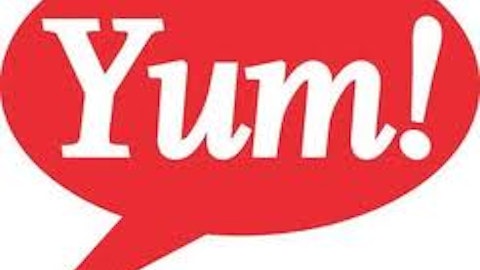
However, last year wasn’t a particular rough year for the overall economy, yet McDonald’s Corporation (NYSE:MCD) turned in one of the year’s most disappointing performances on record, reporting its first same-store sales decline in nine years in November. McDonald’s Corporation (NYSE:MCD) blamed a weakening economy which constrained consumers’ pocketbooks, increasing competition, and European weakness for the shortfall.
A lot of people believe that McDonald’s struggles will only be temporary given its global appeal. McDonald’s Corporation (NYSE:MCD) introduced healthier eating habits with salads and the McWrap, revolutionized fast-food dining with its Value Menu, and has been at the forefront of nearly every major innovation in the fast-food industry over the past three decades. But has anyone considered that maybe McDonald’s is losing its innovative touch?

Source: Commons.wikimedia.org.
From innovator to emulator
McDonald’s CEO Don Thompson, who has been on the job for only a few months now, conducted an interview with CNBC on Friday, where he answered questions regarding the direction his company is headed. Thompson keyed in on some pivotal strategies that he thought would give McDonald’s the opportunity to succeed including the introduction mobile payments, creating even healthier food selections to target millennials, developing a delivery service, and potentially changing its menu to serve breakfast all day.
The reaction among most investors and Wall Street analysts to Thompson’s interview is that McDonald’s has the plan to succeed. My reaction is that Thompson and McDonald’s are on the path to emulation instead of innovation.
McDonald’s Corporation (NYSE:MCD) has severely lagged many of its peers when it comes to the targeting of millennials, both in terms of offering mobile payments as an option and with regard to healthier eating options. While McDonald’s was busy testing eBay Inc (NASDAQ:EBAY)‘s mobile-payment system PayPal in 30 of its French restaurants last year, Starbucks Corporation (NASDAQ:SBUX) locked up a contract to install Square’s mobile readers in 7,000 of its locations.
In terms of healthier eating options, McDonald’s is finding increased competition from the likes of Starbucks Corporation (NASDAQ:SBUX) and Chipotle Mexican Grill, Inc. (NYSE:CMG). Although McDonald’s is doing an admirable job of bringing salads and wraps to fast-food consumers, Starbucks Corporation (NASDAQ:SBUX) and Chipotle Mexican Grill, Inc. (NYSE:CMG) can offer conveniently quick, organic, natural, and/or antibiotic-free sources of meat, fruits, and veggies to customers. With McDonald’s content to stay the course and both Starbucks and Chipotle Mexican Grill, Inc. (NYSE:CMG) stepping up their game, a younger crowd of eaters has made the move away from the Golden Arches toward these two brands.
Similarly, a delivery service in the states could be a novel idea if Burger King Worldwide Inc (NYSE:BKW) hadn’t already beaten McDonald’s Corporation (NYSE:MCD) to the punch. In early 2012, Burger King Worldwide Inc (NYSE:BKW) began testing a delivery service in Washington D.C., using specialized thermal packaging that keeps hot food hot, and cold drinks cold, during the delivery process. Allowing consumers to order nearly the full gambit of items you can get in the restaurant and placing a minimum order price to ensure margins are met has allowed Burger King Worldwide Inc (NYSE:BKW) to one-up its peers. Since this pilot program, Burger King has expanded it to Houston, Miami, and New York, and announced just last week that Los Angeles, Chicago, and San Francisco are up next.


